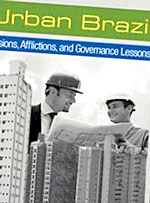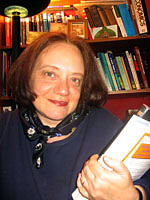 |
From the cover of Vassoler's book on the unlikely success story of a city in trouble. |
 |
Author and researcher, Ivani Vassoler. |
| Study Abroad with Dr. Vassoler: click next page at bottom. |
One of the most livable cities in the world is the product of ingenious planning by politicians, and its story is chronicled in a new book by Political Science Professor Ivani Vassoler of SUNY Fredonia. How city residents and leaders in Curitiba, Brazil, succeeded at very little cost in turning a potential disaster into a thriving metropolis that is friendly to the environment and has expanded city services to the shantytowns, has been the focus of Vassoler’s research for almost 10 years.
A former journalist, Vassoler wrote the book, “Urban Brazil: Visions, Afflictions, and Governance Lessons,” after hours of interviews with urban planners, politicians, scholars, and residents, along with her analysis of hundreds of policy documents, pieces of legislation and scholarly studies during an extended fieldwork in Brazil. She not only chronicles Curitiba's journey; she examines the key political ingredients that cities all over the world should seek to make urban planning work.
“Curitiba proves that public entrepreneurs are powerful catalysts for change in the urban arena,” Vassoler said.
Published by Cambria Press in January, the book caught the attention of The Wilson Center International Center for Scholars in Washington, D.C., and Vassoler was invited to speak during an urban studies conference in June. While there, she was interviewed by the PBS program, “Foreign Exchange,” which will air the program on August 29.
The city of Curitiba, founded in 1653, is one of the oldest cities in the Americas, but during a population explosion in the 1960s turned to long-range planning to turn back the tide of blight and poverty. Checked by a determination to avoid spending money they didn’t have, city officials solved problems creatively--by converting flood-prone ghettos into new parks with man-made lakes, building low-income housing for squatters, hiring teenagers and the unemployed for city maintenance, letting sheep graze to mow the acres of city green space, and distributing 1.5 million tree seedlings to neighborhoods to plant and care for on their own.
The city built a public transportation system that is still the envy of the world--with buses that operate for less than a tenth of what a subway costs. Its recycling programs cleaned up the city and employed the poor.
Curitiba’s inhabitants are attracted toward the city center instead of repelled out to a sprawl of suburbs. They use 25 percent less fuel per capita than other Brazilians, even though they are actually more likely to own cars. With the quality of life surging, the city has attracted new industry, downtown businesses, and tourism.
“The city’s success was not accidental,” Vassoler said. “There are important lessons to learn.”
Vassoler teaches international politics, especially of developing nations, and she is an expert in inter-American relations. Prior to university teaching, she worked as reporter in Brazil, and later as a foreign correspondent in Mexico City and Washington D.C.



